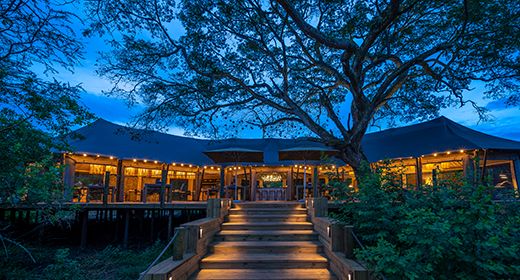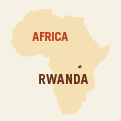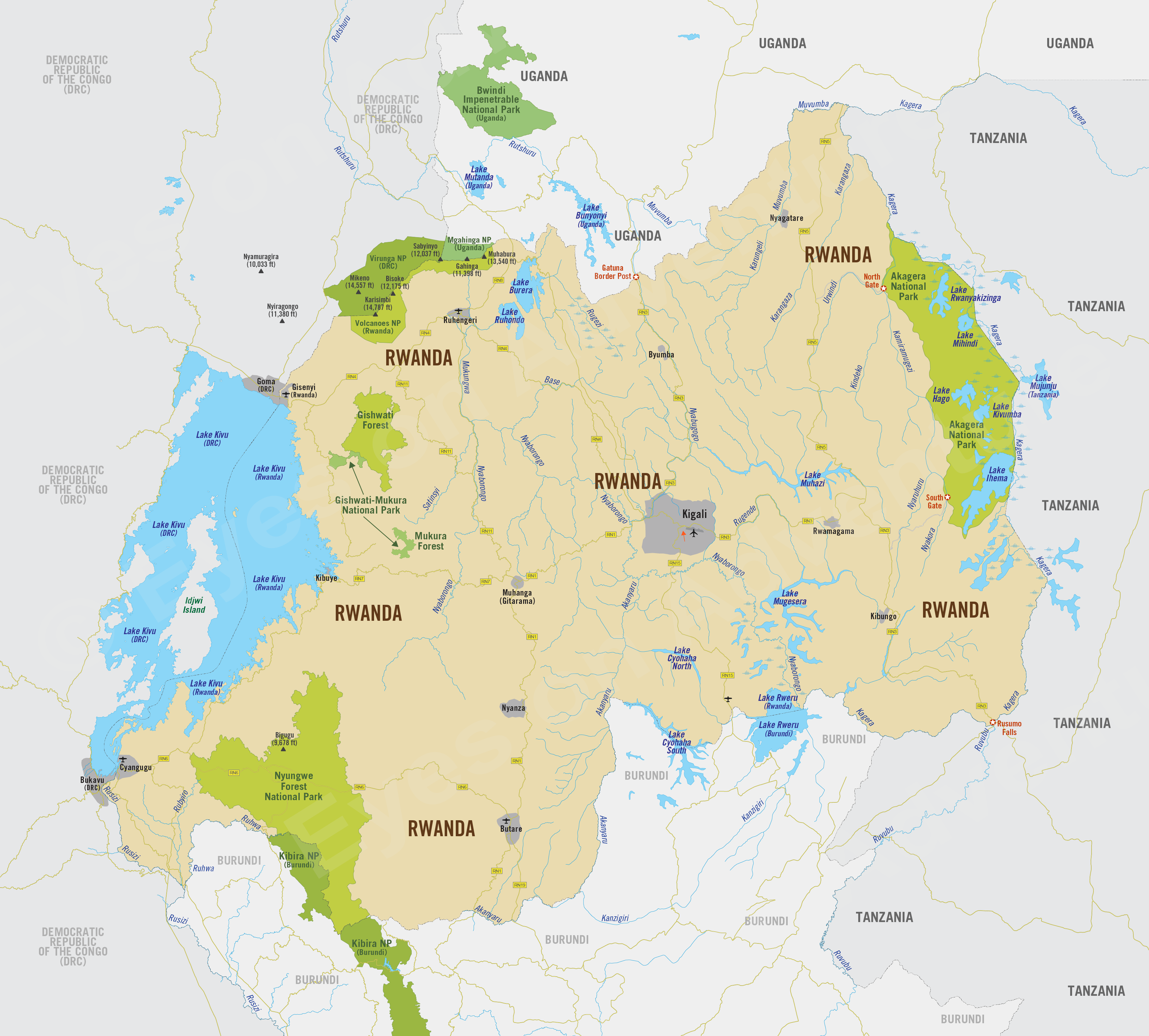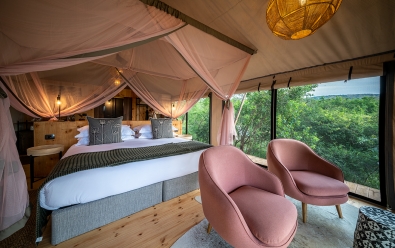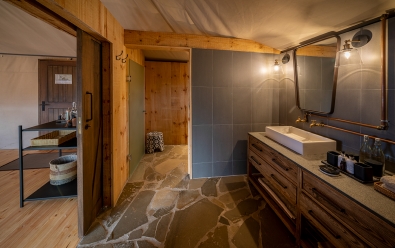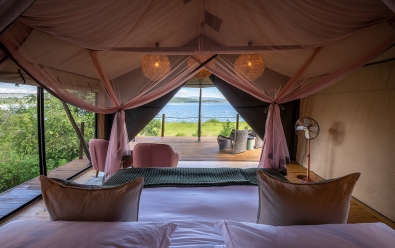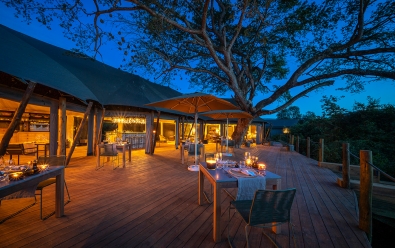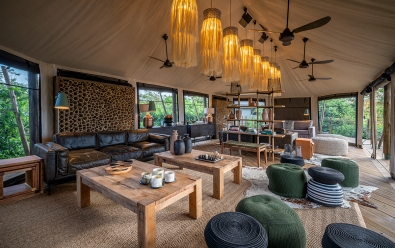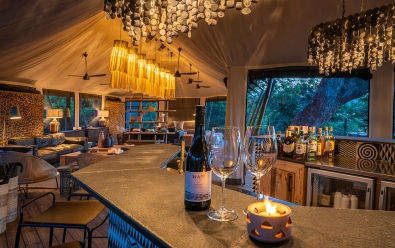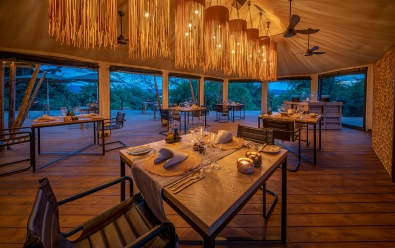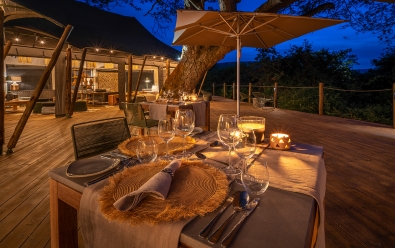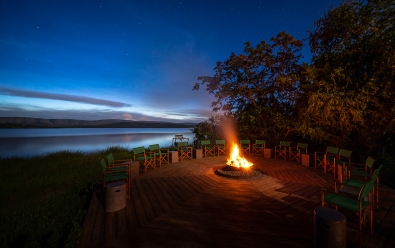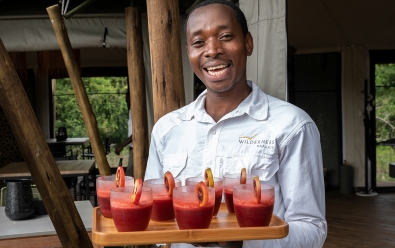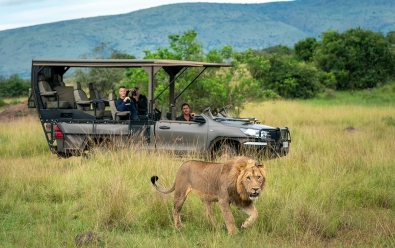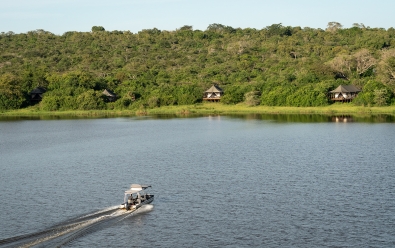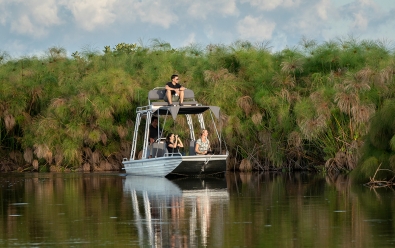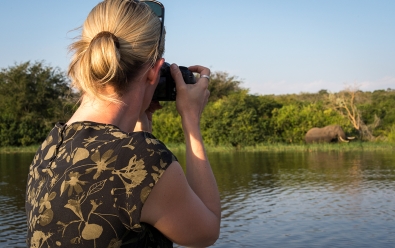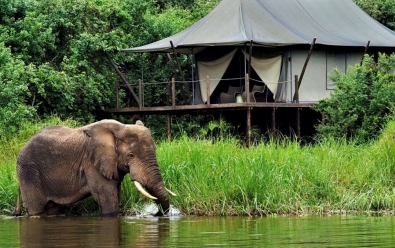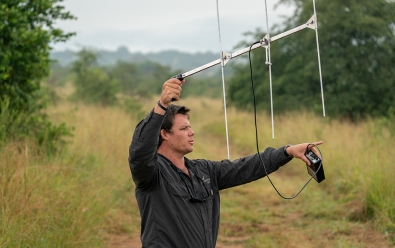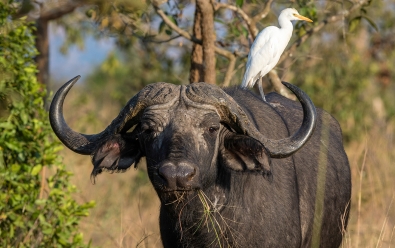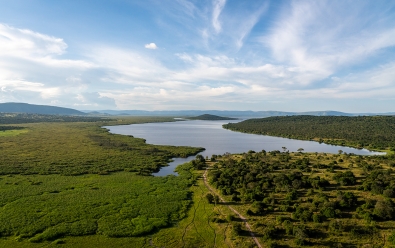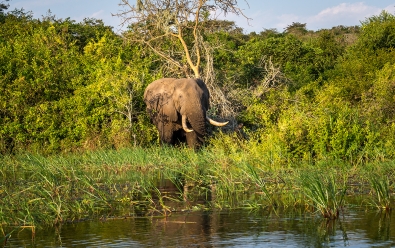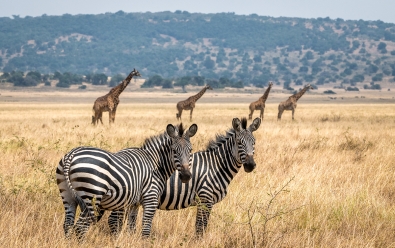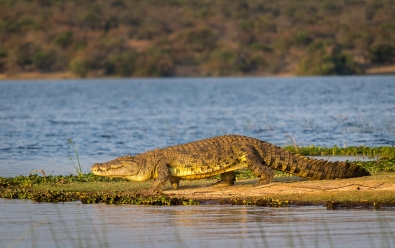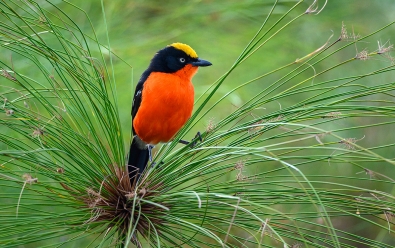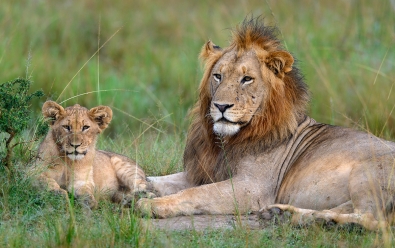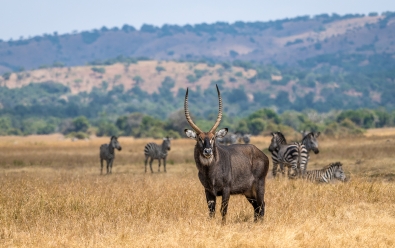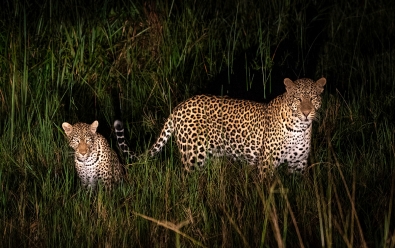Magashi Camp
Highlights
- Small camp (just 6 tents) in an exclusive-use area of the park
- Day and night safari drives, plus boating on a beautiful lake
- Classic East African safari that combines well with gorilla trekking
- The camp operates primarily on solar power
Location
- Lake Rwanyakazinga
- Akagera National Park
- Northeast Rwanda
Magashi Camp is located in the remote northern section of Akagera National Park, overlooking beautiful Lake Rwanyakazinga. The camp offers both land and water activities.
Akagera covers 433 square miles (1 122 sq kms) on the eastern side of Rwanda and is the country's only East African savanna ecosystem. Magashi also has 9.4 square miles (24 sq kms) of exclusive access around its prime location on the lakeshore.
Activities on offer include day and night game drives and boating on the lake to view wildlife and birds. Magashi safari drives and boat safaris traverse the parks varied habitats, which inside hilly grassland savanna, open woodland, papyrus swamps, and the expansive Lake Rwanyakazinga.
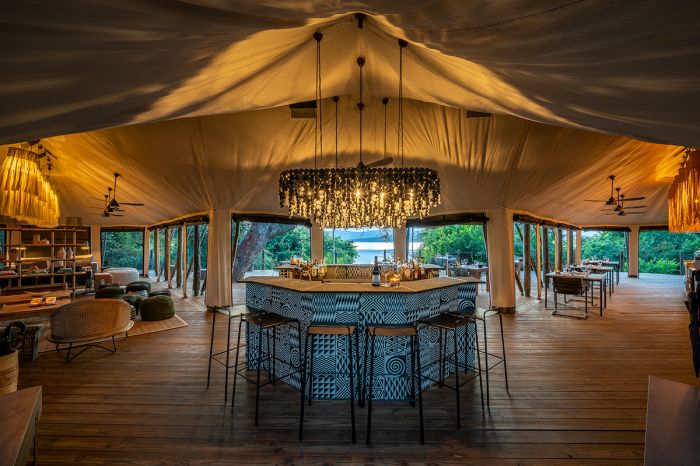
Main area interior at Magashi Camp.
Wildlife viewing at Magashi is very productive, with sightings of the park's lions a common occurrence, and the lakes and swamps having some of East Africa's highest hippo densities. General game of diverse, with healthy populations of buffalo, impala, elephant, topi, defassa waterbuck, and zebra. Leopard are sometimes seen, as are side-striped jackal and spotted hyena. Crocodile are abundant in the swamps and lakes.
Birding is outstanding, with over 480 species recorded in the park, including lesser-seen species like African shoebill and papyrus gonolek.
Magashi offers just 6 spacious tented guest units, each of which has unimpeded views onto the lake. The tents are connected by elevated wooden walkways that lead to the main camp area. The guest rooms have private wooden decks for relaxing and enjoying the views. The main lounge, dining area, and bar pool are built atop raised wooden decking to maximize the vista onto Lake Rwanyakazinga and the Mutumba Mountains.
Wilderness Safaris are one of Africa's leading safari operators and they strive to minimize energy consumption at all their camps. Magashi Camp is powered almost entirely by solar power, with a diesel-powered generator used as back-up. Strict eco-friendly environmental standards are maintained so that no harmful chemicals or waste is allowed to enter the pristine ecosystem of the national park.
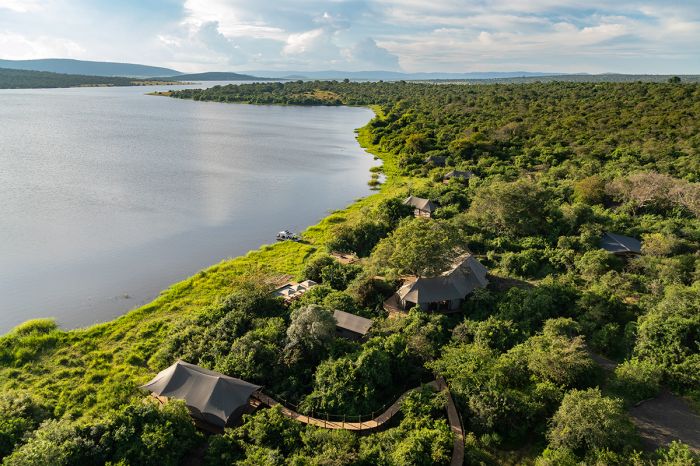
Aerial view of Magashi Camp on the shores of Lake Rwanyakazinga.
About Akagera National Park
Located along Rwanda's eastern border with Tanzania is the 433-square-mile (1 122-sq-km) Akagera National Park. Proclaimed in 1934, the park is the country's only East African savanna-type ecosystem. Akagera was until recently a far larger protected area, but land on the western side of the park was de-gazetted in 1997 to make living space for thousands of returning refugees who had been displaced by the genocide.
In fact by the end of the 20th century, Akagera was on the verge of collapse, with refugees inhabiting the northern portion of the park. Overgrazing by domestic livestock and rampant poaching threatened what remained of the park's wildlife. In order to stem the complete loss of this beautiful ecosystem, African Parks, a non-profit conservation organization, was given management (in partnership with the Rwandan Development Board).
Under Africa Parks' management, Akagera has made an astounding rebound from near total collapse to a thriving safari destination. Anti-poaching patrols have eliminated all but the rare instance of illegal hunting, all cattle and illegal squatters have been evicted, and in 2013, a predator-proof fence erected along the entire western border to eliminate human-animal conflict. The new management also runs environmental education to help local people living near the park to value the wildlife as a resource via tourism rather than hunting.
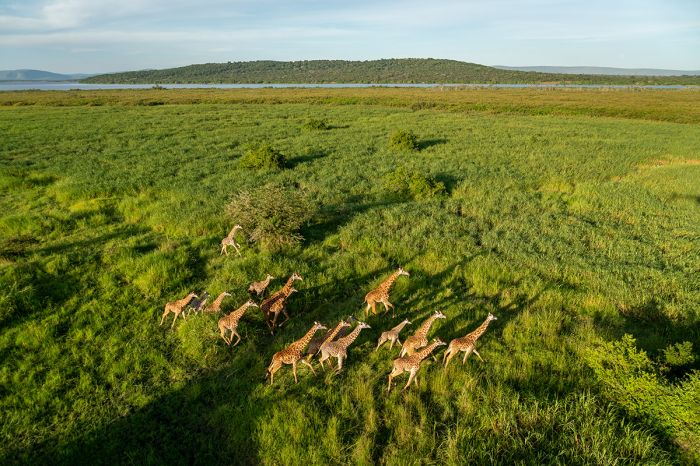
Aerial view above Akagera National Park and Masai giraffes.
Two of Akagera's original resident species, lion and black rhino, became extinct in the park during the poaching years, but have since been reintroduced by African Parks. In 2015, a founder population of 7 lions were reintroduced in Akagera, with two additional males introduced in 2017 to increase genetic diversity. The lion population in the park has since quadrupled, and lion are now seen regularly on safaris in Akagera.
In 2017, eighteen black rhinos were reintroduced and many years of absence in the park and white rhinos were reintroduced in 2021. With these species now roaming free in the park, Akagera is again a Big-Five safari destination.
Akagera is quite diverse with respect to habitats and is mainly low-lying, with an extensive wetland of papyrus swamps and lakes running north-south along the park's eastern boundary with Tanzania. Further west, the habitat transitions to rolling grasslands, dense woodlands, and Acacia scrub.
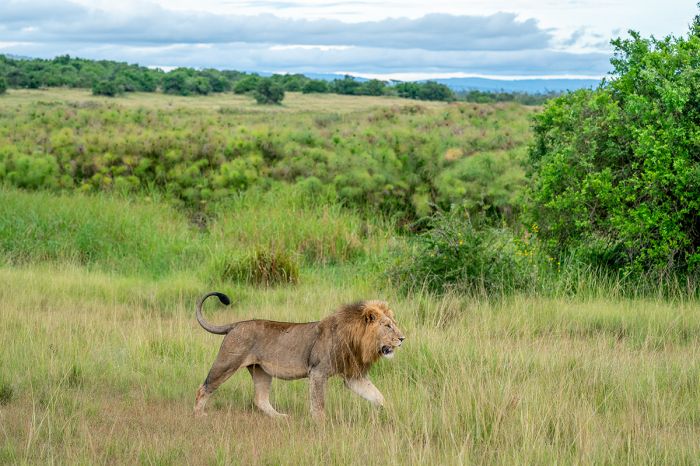
A male lion in Akagera National Park, not far from Magashi Camp.
The park's diversity of habitats allows for a variety of wildlife that includes commonly seen species like elephant, buffalo, impala, zebra, defassa waterbuck, topi, Masai giraffe, oribi, bohor reedbuck, roan, eland, and klipspringer.
The lion population is doing well and they are seen regularly, as are leopard and spotted hyena. Common small predators include serval, side-striped jackal, and several species of mongoose. Hippos and crocodiles are abundant in the park's lakes and swamps. Primates include olive baboon, vervet monkey, and Dogett's silver monkey.
Owing to the park's great diversity of habitats, birding in Akagera is outstanding, with a mix of grassland, woodland, and water birds present. The park's bird list is over 400 species and a dedicated day on safari can easily mean over 100 species seen, including specials like papyrus gonolek and shoebill stork.
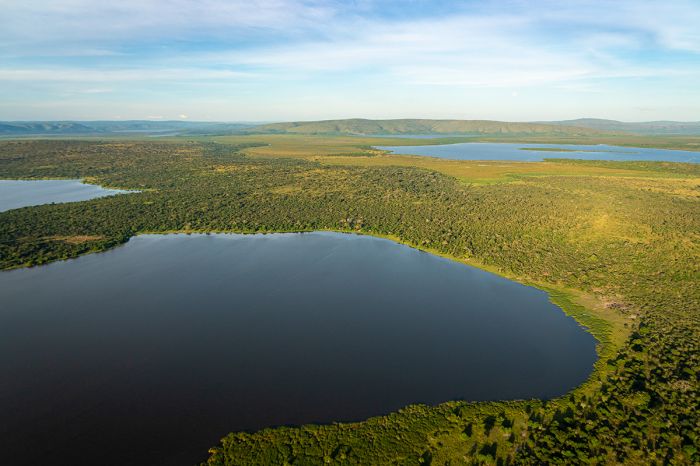
Lofty view of Lake Rwanyakazinga and further west into Akagera National Park.
ROOMS INCLUDES & EXCLUDES CHILDREN FACILITIES ACTIVITIES
Accommodation
6 guest accommodations in total comprising:
- 6 twin-bedded, luxury canvas tented rooms, each with two three-quarter beds. Mattress converters are available that transform twin beds into a king-size beds (to be arranged prior to arrival).
Each canvas-tented accommodation is constructed atop an elevated wooden deck with views of Lake Rwanyakazinga and the Mutumba Mountains. En-suite facilities include an indoor shower, a single-vanity basin, and separate toilet. The design and interiors of the tented rooms reflects traditional Rwandan culture.
The guest tents are connected to the main camp area by elevated wooden walkways.
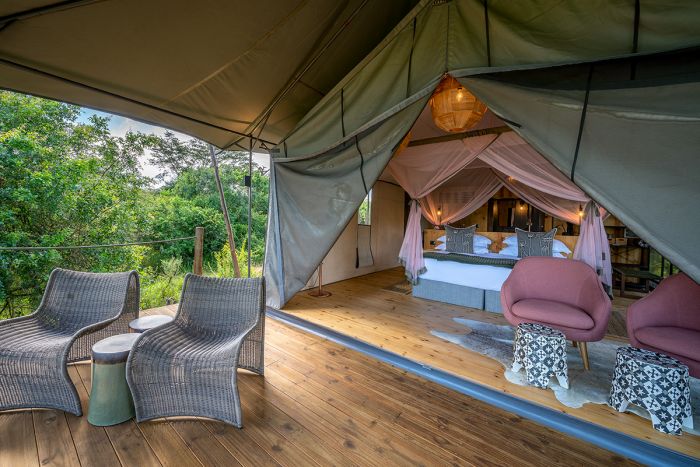
Guest tent interior and shaded outdoor deck.
Guest room amenities include a writing desk and chair, easy chairs, an outside deck with seating, multi-plug charging facilities, and mosquito netting for the beds.
Other items and features in the guest units include:
- Wardrobe.
- Luggage rack.
- Hat and coat stand.
- Electronic safe.
- Tea and coffee making facilities.
- Mini-bar.
- Hairdryer.
- Pedestal fan.
- Yoga mat.
- Free weights (2x 1-kg) and resistance band.
- Skipping rope.
- In-tent Wi-Fi.
- Two-way emergency radio to contact Camp Management during the day (e.g. ordering “room” service) and at night in the event of an emergency only (radios are on a closed circuit and inter-tent communication is not available).
- Personal amenities, including bathrobes, slippers, liquid soap, shampoo and conditioner, body lotion,, insect repellent, room spray, shower caps, vanity kit with cotton-tip swabs, cotton balls, tissue dispenser, and umbrella.
Magashi Camp can accommodate a maximum of 12 guests in total: 2 persons in each of the 6 tented rooms.
Includes & Excludes
Includes:
- All meals and local beverages including wines, spirits and liqueurs, but excluding premium imported brands and Champagne.
- Transfers between the camp and North Gate of the park.
- Twice-daily safari drives in open game-viewing vehicles and other scheduled camp activities (accompanied by experienced guides).
- Laundry services are provided on a daily basis (weather permitting, items will be returned on the same day). Laundry is dried by the sun and on most days any laundry placed out in the morning will be returned by the evening.
- Wi-Fi access.
- Local government taxes.
Excludes:
- Purchases from the Safari Trading Store.
- Premium imported beverages and Champagne.
- Conservation levy.
- Any applicable wildlife fee, park fee, reserve fee, concession fee, other land-use fee.
Single Supplement
A single supplement will apply for any room booked by a single traveler; please ask us for pricing.
Children
Children aged 6 years and older are accommodated at Magashi:
- For families traveling with children between 6 and 12 years, private activities must be booked and paid for. As there is no private vehicle offering at Magashi, a minimum of 3 tents (either on double-occupancy or single-occupancy with a single supplement) must be booked and charged for to accommodate this.
- Children between 6 and 16 years must share with an adult/s in the same room.
- The minimum age for boating activities is 6 years (water levels permitting).
Facilities
- Pool in main area with partially shaded deck and loungers.
- Main lounge, dining, and bar areas situated on elevated wooden platforms (with all tents and main areas connected by elevated wooden walkways).
- Campfire deck with views over the lake.
- Small curio shop.
- A pair of Olympus binoculars in the main area.
Activities
Activities included in the rate:
- Day and night game drives in 3x 10-seater Toyota Hiluxes, each accommodating a maximum of 7 guests, which gives each passenger an outside seat.
- On chilly winter mornings, hot water bottles, blankets, and lined ponchos are provided.
- A pair of Olympus binoculars is available in each of the game drive vehicles for guests to share amongst themselves whilst game viewing and may be requested from our guides.
- Water-based activities in 1x 6-seater swamp cruiser boat (water levels permitting and mostly at the beginning of the season).
- Birding.
- Stargazing with a laser pointer
Optional activities at additional cost:
- Private activities are on offer. Note that there is no private vehicle offering at Magashi, so a minimum of 3 tents (either on double-occupancy or single-occupancy with a single supplement) must be booked and charged for to accommodate this.
Example of a typical day:
- Early morning wake-up call. Morning wake-up and activity times vary according to the seasons, activities on offer, and wildlife sightings.
- Light breakfast before departing on the morning activity.
- Return to camp for a meal and rest period.
- Meet for afternoon tea and snacks (savory and sweet choices) before departing on the activity.
- Return to camp - freshen up or meet for drinks, followed by dinner.
- Enjoy a nightcap or discussion around the fire before retiring.
Great Good Fair Poor
- Jan
- Feb
- Mar
- Apr
- May
- Jun
- Jul
- Aug
- Sep
- Oct
- Nov
- Dec
Best time to visit
In terms of safaris, the best time to visit Akagera is during the dry period between mid-June and late-October. This is also high season, although Akagera still does not receive enough visitors (with only a few safari camps for the entire park) to ever be called busy.
Magashi Camp is open year-round.
Rain Seasons
Much like Tanzania, which lies directly east of Akagera National Park, safaris are often scheduled around the regional rains, which fall in two distinct timeframes and are commonly known as the 'short' rains and the 'long' rains. The 'short' rains typically start sometime in October or November and last about 4-6 weeks. These rains are usually not heavy and visiting at this time should still produce good wildlife viewing on safari.
After the 'short' rains, a relatively dry period ensures, lasting until around mid-March, when the 'long' rains begin. These rains are much more significant, with rainfall likely on any given day and can sometimes last a good part of the day, at times producing heavy downfalls.
The long rains usually last for 2-3 months, ending for the most part by late-May. This is a time to avoid on safari, as the rains can impact your visit. The rains in May are diminishing, so late May is generally a safe bet.
Climate
Temperatures in Akagera are warm throughout the year and fairly static, with dry season (June-October) temps during the day averaging 77-81°F (25-27°C). Overnight temps are on the chilly side, averaging 55-59°F (13-15°C) and dressing in layers is advised for the morning safari activity.
Rainy season (October-May) temperatures in Akagera are slightly warmer than in the dry months, averaging 79-82°F (26-28°C) during the day and 59-63°F (15-17°C) overnight.
The air actually feels warmer during the dry season, as the slightly higher temps during the summer are offset by the rains and cloud cover, while the dry winter days are typically sunny and very dry.




